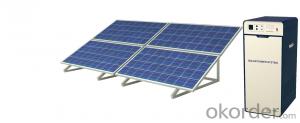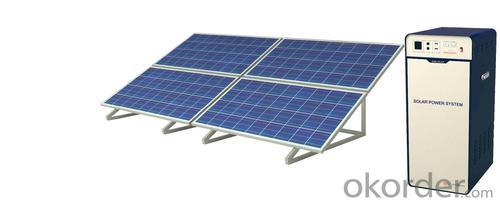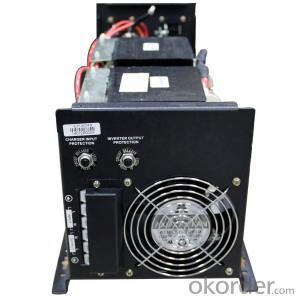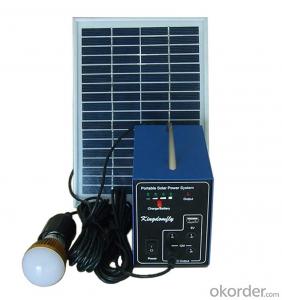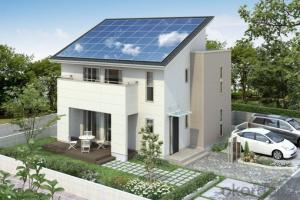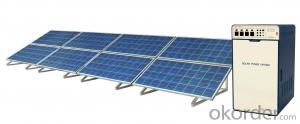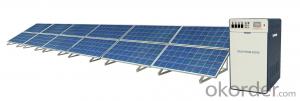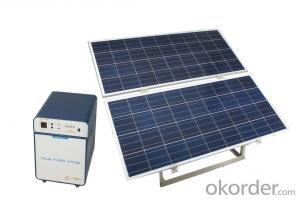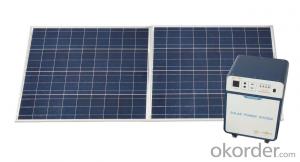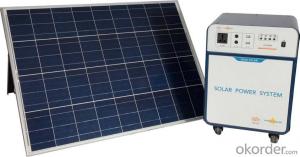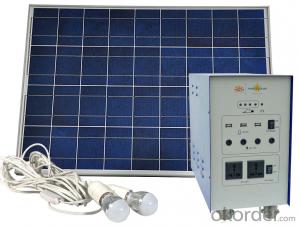Suntec Solar Energy Systems Off-Grid Solar Power System JS-SPS-1000
- Loading Port:
- Tianjin
- Payment Terms:
- TT OR LC
- Min Order Qty:
- 10 set
- Supply Capability:
- 10000 set/month
OKorder Service Pledge
Quality Product, Order Online Tracking, Timely Delivery
OKorder Financial Service
Credit Rating, Credit Services, Credit Purchasing
You Might Also Like
General Introduction
Solar power system provides alternating current and direct current, which is produced by the modules transforming solar power into power, to home lighting, household appliance and other DC appliance, such as cell phone and laptop.
Solar power system is widely used in area lack of power, for example house power supplying, monitoring, communication base, fire prevention in forest area, pasture and meadow, aquaculture etc.
We are dedicated to provide high quality off-grid PV products and systems to customers and has received a series of certificate, including ISO9001, TUV, UL, CE, CQC and RoHS.
Off-grid Solar Power System
High efficent PV module can produce more power.
Sine wave output is suitable for all kinds of load. Varieties of DC output, let it more
convenient for users.
The multifunction design make it easy to operation and maintenance.
Solar power system provides alternating current and direct current, which is produced by the modules transforming solar power into power, to home lighting, household appliance and other DC appliance, such as cell phone and laptop.
Solar power system is widely used in area lack of power, for example house power supplying, monitoring, communication base, fire prevention in forest area, pasture and meadow, aquaculture etc.
We are dedicated to provide high quality off-grid PV products and systems to customers and has received a series of certificate, including ISO9001, TUV, UL, CE, CQC and RoHS.
Off-grid Solar Power System
High efficent PV module can produce more power.
Sine wave output is suitable for all kinds of load. Varieties of DC output, let it more
convenient for users.
The multifunction design make it easy to operation and maintenance.
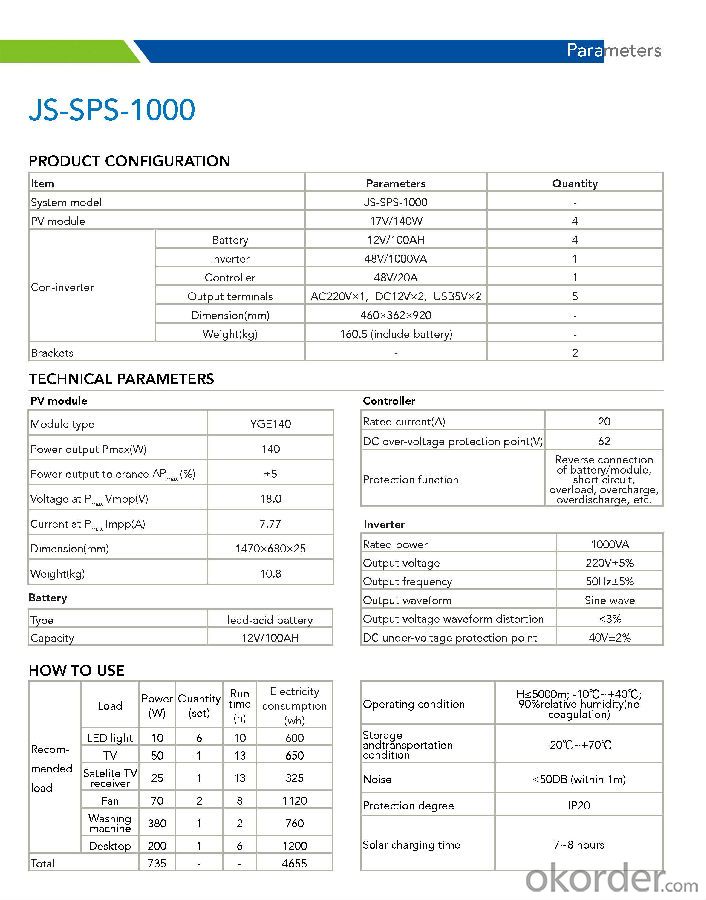
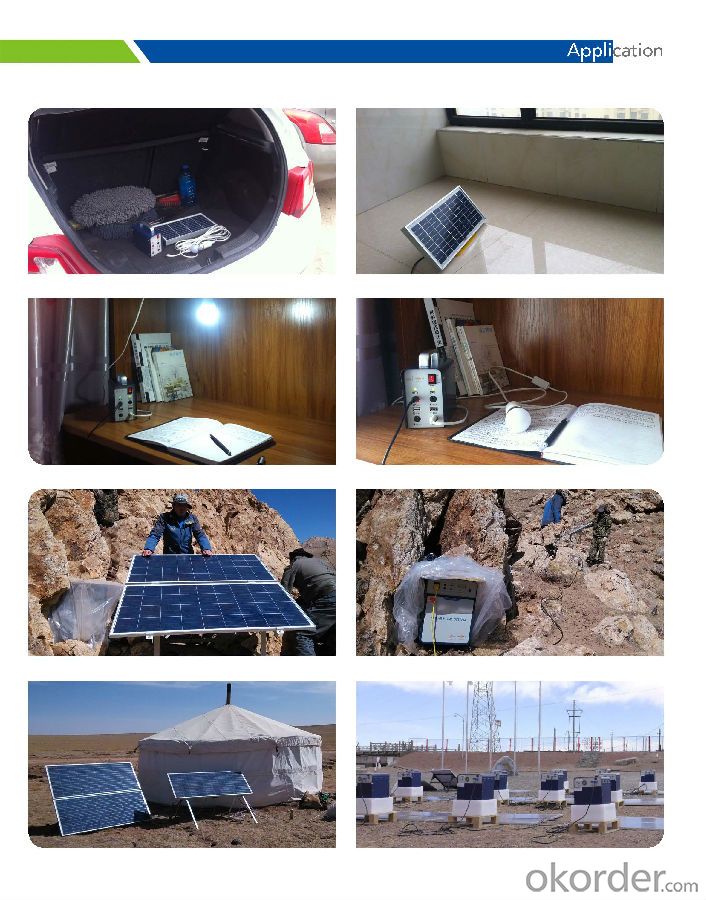

- Q: Can solar energy systems be used for powering drones?
- Yes, solar energy systems can be used for powering drones. Solar panels can be installed on the surface of the drones to capture sunlight and convert it into electrical energy, which can then be used to power the drone's motors and other components. This allows drones to have longer flight times, reduced reliance on traditional batteries, and a more sustainable and environmentally friendly power source.
- Q: How do solar energy systems integrate with other renewable energy sources?
- Solar energy systems can integrate with other renewable energy sources through a concept known as hybrid renewable energy systems. These systems combine the generation of solar power with other sources like wind, hydro, or biomass to create a more reliable and efficient energy solution. By diversifying the energy sources, a hybrid system can ensure continuous power supply even when there is insufficient sunlight. Additionally, the integration of multiple renewable sources allows for better utilization of resources and enhances the overall sustainability of the energy system.
- Q: Can solar energy systems be used for powering shopping malls?
- Certainly, shopping malls can indeed utilize solar energy systems to power their operations. The sun's energy can be captured by installing solar panels on the rooftops or parking lots of shopping malls. This captured energy can then be converted into electricity, which can be used to power various functions within the mall, such as lighting, heating and cooling systems, escalators, elevators, and other electrical appliances. By embracing solar energy, shopping malls can greatly reduce their reliance on conventional energy sources and decrease their carbon emissions. Moreover, solar energy systems can contribute to long-term electricity cost savings for malls, as they produce clean and renewable energy. All in all, solar energy systems offer a feasible and sustainable solution for meeting the power needs of shopping malls.
- Q: Can solar energy systems be used for powering data centers or IT infrastructure?
- Yes, solar energy systems can be used for powering data centers or IT infrastructure. With advancements in solar technology and the increasing demand for sustainable energy sources, many data centers are now adopting solar power as a viable option for their energy needs. Solar panels can be installed on the rooftops or surrounding areas of data centers to harness sunlight and convert it into electricity. This renewable energy source not only helps reduce carbon emissions but also provides a reliable and cost-effective power supply for data centers, making it an environmentally friendly solution for powering IT infrastructure.
- Q: Can solar energy systems be used in disaster-prone areas?
- Certainly, solar energy systems have the potential to be utilized in areas prone to disasters. In reality, they can prove particularly advantageous in such regions. Conventional power grids often prove to be fragile and susceptible to damage during natural calamities such as hurricanes, earthquakes, or floods. Consequently, these events can result in prolonged periods without electricity, hindering relief and recovery efforts. On the other hand, solar energy systems are decentralized and can operate independently from the grid. These systems consist of solar panels that convert sunlight into electricity, which can then be stored in batteries for use during power outages. This enables critical facilities, including hospitals, emergency response centers, and shelters, to function even when the grid is not operational. Solar energy systems can provide a reliable source of power for lighting, communication, refrigeration, and medical equipment, significantly enhancing the resilience and efficacy of disaster response. Moreover, solar energy systems can also be employed to power water pumps, ensuring that communities have access to clean water during crises. This is particularly crucial in disaster-prone areas where access to safe drinking water can be severely compromised. Solar-powered pumps can extract water from wells, rivers, or other sources, ensuring a consistent supply for drinking, sanitation, and hygiene purposes. Additionally, solar energy systems can contribute to long-term recovery efforts in disaster-prone areas. By reducing reliance on fossil fuels and conventional power grids, they can aid in the creation of sustainable and resilient communities. Solar panels can be installed on rooftops or in open spaces, utilizing the abundance of sunlight resources. This not only reduces greenhouse gas emissions and mitigates climate change but also provides a dependable and cost-effective source of energy for homes, businesses, and public infrastructure. In conclusion, solar energy systems can effectively serve disaster-prone areas by providing dependable power, supporting critical services, and promoting long-term resilience. By harnessing the power of the sun, these systems offer a sustainable and decentralized solution to energy needs, ensuring that communities can withstand and recover from natural disasters more effectively.
- Q: Can a solar energy system be installed on a commercial parking lot?
- Yes, a solar energy system can be installed on a commercial parking lot. Commercial parking lots often have ample space for solar panels to be installed on canopies or mounted on structures like carports. This allows for the generation of clean and renewable energy while also providing shade and protection for vehicles. Additionally, commercial parking lots are typically well-suited for solar installations due to their large surface areas and accessibility to sunlight.
- Q: Can solar energy systems be used for powering remote monitoring equipment?
- Yes, solar energy systems can be used for powering remote monitoring equipment. Solar energy systems use photovoltaic (PV) panels to convert sunlight into electricity, which can then be used to power various devices and equipment. Remote monitoring equipment, such as weather stations, surveillance cameras, or communication systems, can be easily powered by solar energy systems. These systems are particularly useful in remote or off-grid locations where access to electricity may be limited or non-existent. Solar energy is a sustainable and renewable source of power, making it an ideal choice for powering remote monitoring equipment without relying on fossil fuels or traditional electrical grids. Additionally, solar energy systems can often be combined with battery storage to provide continuous power supply even during periods of low sunlight.
- Q: Can solar energy systems be used to power boats or yachts?
- Yes, solar energy systems can indeed be used to power boats or yachts. Solar panels can be installed on the roof or deck of a boat to capture sunlight and convert it into electricity. This electricity can then be used to power various onboard systems, such as lights, navigation equipment, communication devices, refrigeration, and even propulsion systems. The size and capacity of the solar energy system will depend on the specific power requirements of the boat or yacht, as well as the available space for installation. Solar-powered boats and yachts offer several advantages, including reduced reliance on fossil fuels, lower operational costs, quieter operation, and reduced carbon emissions. However, it is important to note that solar energy alone may not be sufficient to power larger vessels or during prolonged periods of low sunlight. In such cases, a hybrid system that combines solar energy with other power sources, such as wind or diesel generators, may be more suitable.
- Q: Can solar energy systems be used in powering fire stations or police stations?
- Yes, solar energy systems can be used to power fire stations or police stations. Solar energy is a renewable and sustainable source of power that can provide a reliable and cost-effective solution for these facilities. Fire stations and police stations typically require a consistent and uninterrupted power supply for lighting, communications, security systems, and other essential equipment. Solar panels can be installed on the rooftops or in nearby areas to harness sunlight and convert it into electricity. This electricity can then be used to power the various electrical systems within these facilities. By using solar energy, fire stations and police stations can reduce their reliance on traditional grid electricity, lower their operational costs, and contribute to a greener environment. Additionally, solar energy systems can also include battery storage to store excess electricity generated during the day, ensuring a continuous power supply even during nighttime or periods of low sunlight. Overall, solar energy systems are a viable and practical option for powering fire stations and police stations, promoting energy independence and sustainability for these crucial public service institutions.
- Q: How does the temperature affect the performance of solar panels?
- The temperature has a direct impact on the performance of solar panels. Generally, higher temperatures can cause a decrease in the efficiency of solar panels. This is because as the temperature rises, the electrical conductivity of the materials used in the panels decreases, leading to a reduction in the conversion of sunlight into electricity. Additionally, higher temperatures can increase the resistance within the solar cells, resulting in a decrease in the overall power output. However, it is important to note that solar panels are designed to tolerate a wide range of temperatures and their performance can still be significant even in hot weather.
Send your message to us
Suntec Solar Energy Systems Off-Grid Solar Power System JS-SPS-1000
- Loading Port:
- Tianjin
- Payment Terms:
- TT OR LC
- Min Order Qty:
- 10 set
- Supply Capability:
- 10000 set/month
OKorder Service Pledge
Quality Product, Order Online Tracking, Timely Delivery
OKorder Financial Service
Credit Rating, Credit Services, Credit Purchasing
Similar products
Hot products
Hot Searches
Related keywords
